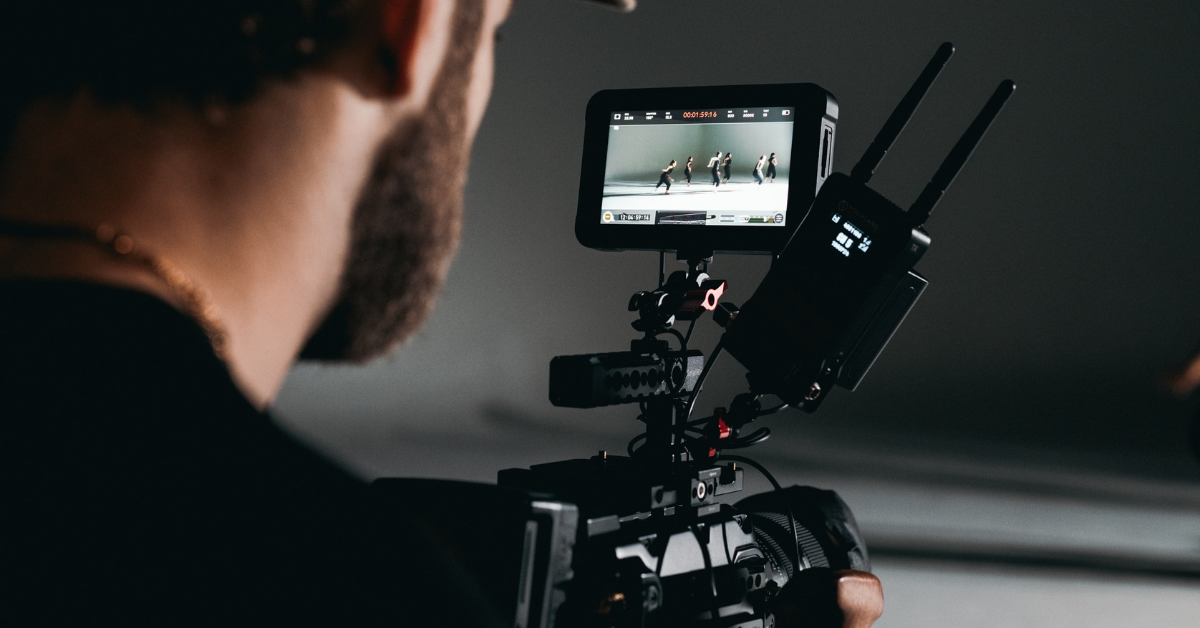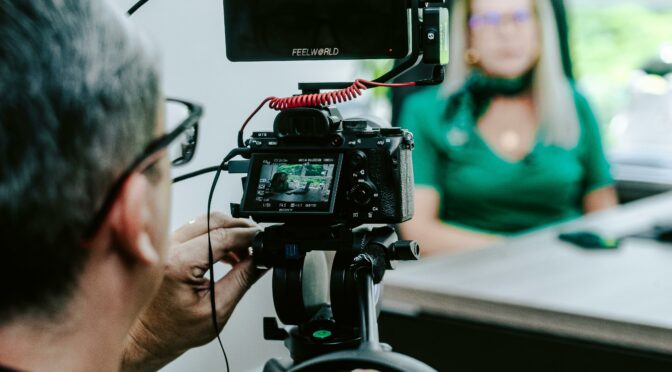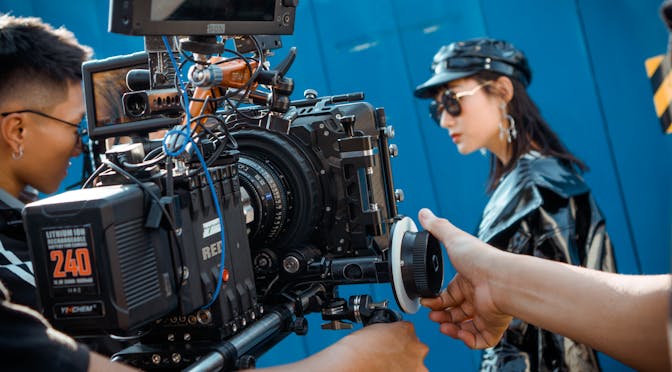Congratulations. You’ve decided to embark on a filming project for your brand, business, event, music video, short film, granny’s birthday or maybe something I haven’t thought of. Either way, I’m excited for you and best of luck with whatever you are planning.
Quite rightly, you’ve decided to hire a videographer to work on “said project” but you don’t know where to start. Well, never fear, I’m here to help. Here’s my essential guide to hiring a videographer and everything you need to know to make sure you get the best person for your project.
What does a videographer do?
It’s a funny term “videographer” isn’t it? It sounds like a photographer but for film rather than photography. And you might be fooled into thinking that this is someone who will turn up with a camera and just grab you some footage. But in reality, a videographer does so much more than this. A videographer goes by that moniker rather than “camera person” or “director of photography” as the more artsy camera operators like to call themselves because they are usually offering services that go far beyond just picking up a film camera and shooting stuff.
A videographer is usually someone who offers a more rounded, end-to-end service. They’ll often work with you on your creative ideas and then make all the arrangements for the shoot. They may play the part of the director on set, directing the action. They will then often take all that footage and edit it together into a finished film using software like Adobe Premiere. They can be a one-stop shop for all your filming and video production needs.
>> Check out our blog: Videographer vs Video Production Company, which is best.
Now, as a founder of a UK video production company, it would be remiss of me not to point out the advantages and disadvantages of working with a videographer over working with a video production company like ours…
The advantages are firstly that a videographer is a lot more affordable. And that’s a big selling point for many people. You are going to be paying a freelance rate and cutting out the middleman by working directly with the person who’s actually doing the work. If you find someone who’s really skilled at their work, then you’ve hit the jackpot, and they will undoubtedly do a great job for you. Also, working with a videographer means that you can be heavily involved in the project and have full creative control over what’s happening. This is an advantage if you know what you want.
The drawbacks can be that videographers are sometimes jack of all trades and masters of none, so you don’t get specialist film skills. Flying solo, they won’t be supported by a team to do all the nitty gritty of organising a filming project, so they may be slower to complete the work and make mistakes. And finally, you are reliant on their availability and working at their own pace. So if a bigger client comes along, you may find yourself taking a back seat to higher-paid offers of work.
If you want to find out more about the merits of hiring a videographer vs a video production company, then read this article. Setting aside the pros and cons, let’s just say that for the purposes of this article, a videographer is what you’re looking for. Now let’s work out how you hire the best videographer for your specific needs.
Creating a brief for a videographer
Before you start on your mission to hire a videographer, it’s absolutely essential that you have a good briefing document. Whatever you do, do NOT start without this. You’ll waste both yours and the videographer’s time without it. You can be as detailed as you like, but I prefer briefs that are kept to just a few pages. The more complex and detailed they are, the higher the likelihood that you are asking for something that is too advanced for a videographer to handle and also probably out of budget.
Here are some of the key things to include in your briefing document for your videographer:
- Your details
- A summary of your project
- Your audience
- Deliverables (the videos you need and length)
- The timeline including filming days and finished film final delivery date.
- Creative ideas and reference examples
- Budget
By creating a good brief, you will be able to compare apples with apples when it comes to comparing different quotes from videographers. This will be essential when it comes to hiring the right person. As you take this brief out to different video professionals, you will undoubtedly get some feedback and new ideas to include in your brief. And that’s fine. But if you do decide to run with any of those ideas, then make sure you update your briefing document and then re-share it with the candidates.
How to find a videographer
The best way to find a good videographer to work with is by reaching out to your existing network for referrals. Finding someone tried and tested that has been recommended by your peers will help you avoid any of the nasty pitfalls associated with hiring the wrong person. Make sure you find out what they worked on, look at the results they delivered and check about the rate they were paid for the job. This will give you a starting point to negotiate a fixed fee for your project. For more information about fees, read this article.
You might find you get a good recommendation, but that person is not available. In this instance, ask them if they can refer you to anyone else they know. The video production industry is a very closed and cliquey world where everyone knows each other. Referrals amongst peers will usually be made to people they rate as being good enough.
If these methods come up with nothing, then your next, best bet is to extend the net more widely. Look for examples of video work that are similar to what you want to do and reach out to those people to find out which video supplier they used. For example, if you are looking for a videographer to film your corporate event, then cast around for epic event videos you’ve seen by people within your industry. Reach out to the marketing manager to find out who did it and would they make a referral? If you are looking to create some social media video content for your brand, look at other great examples of work you admire and see if you can find out who made it. If you are looking for a videographer for your wedding then reach out to friends or friends of friends who recently had a good wedding video made. You get where I’m going with this.
Finally, you might have to just get stuck into a good, old-fashioned Google search. Literally type into the search bar “Videographer near me”, “Videographer UK” or maybe someone more specific to your town like “Videographer in London” or “Videographer Brighton, Bristol or Manchester”. You will find that some videographers have really compelling websites that will show up in a Google search.
>> Read our Blog: How to Hire the Best Video Production Company for your Business
Check their credentials
Don’t be afraid to interrogate a videographer’s experience and work. It’s easy to get bamboozled by a videographer’s claims that they are “experts in their field” but often, when you look under the surface, you’ll find they don’t have the level of experience that they claim. Many people will have very flashy showreels which showcase their best work and a wonderful website that makes them look very professional, but very few will actually have a CV that identifies their experience level and track record. This drives me mad when we are looking to hire people for our video production company in London.
Your first step is to find them on LinkedIn and look at how many years of experience they have. Are they fresh out of uni, or do they have skin in the game? Do they have any formal training, like doing a university degree at a top film, video or television production school? What have they actually worked on, and what does their profile say? If they aren’t a fan of LinkedIn and haven’t done much on their profile (quite likely), then ask for a creds list. This is a list of top productions they’ve worked on.
Next, ask them to send specific examples of work that matches the project you are trying to do. If you plan to shoot a short film, have they worked on productions like this? If you plan to film a talking head video with a corporate client, have they lit a scene like this before? If you are shooting a fast-paced sports action film, have they done this before? There are so many specialisms in the video production world that it’s good to find someone who’s done something similar to your project. So they’ll know the drill and how to get you the best footage.
Ask about equipment
I’m not expecting you to know the ins and outs of this camera vs that camera and whether you should be using a Sony A7Siii, Sony Fs7 or a Sony Venice. Nor would you know what lighting you might need, sound recording equipment or rigging equipment like a gimbal or dolly track. But if you clearly explain your project and what you are hoping to achieve, then they should be able to provide you with a kit list that they own (or have access to) that can do the job. Ask them to explain this to you. If they can’t, then that should send off alarm bells.
Negotiate their rate
Most Videographers will have a day rate, and they should (hopefully) be able to share that with you. Depending on what part of the country you are in, the experience level of the individual, and the equipment they come with, that rate can vary tremendously. I’m afraid there’s no simple way to break this down for you. They may also charge one rate for planning, another for filming and another for editing. How much does it cost to hire a videographer? These numbers could range from £100 per day for a student filmmaker to well over £1000 for someone who is very experienced. Your best bet is to work out your budget, share that with the videographer you are talking to and see if it fits. They will often be happy to do a deal (called a “buy-out” in the industry) for the project as a whole. And sometimes, you may be able to negotiate a lower rate if you are happy to be flexible on project length and videographer availability.
When it comes to starting your project, expect to pay a deposit with the videographer you have hired and to pay the remaining balance in stages as you move through the project. Freelancers are terrified of not getting paid at the end of a piece of work, particularly when they don’t have a relationship with you already. So do the honourable thing and pay them promptly if you think they’ve done a good job.
Keep on top of them
Working with a videographer rather than a video production company means that you will need to project manage them directly. You need to keep on top of them to make sure they are delivering to your expectations. Provide constant feedback and constructive criticism if needed to ensure you get what you want. Try to be considerate of their feelings also. Creative types can take it quite personally if you are too critical of their work. And remember, if someone is not working out, you can always choose to end the contract with them and find someone else. But unless there has been a major service level failure, you still need to pay them for work completed to date.
So that’s it. A comprehensive guide on how to hire a videographer. And I must mention that getting the right person is no mean feat. And the good ones are almost never available. So if you are struggling to find the right person, then you may need to allocate a little more budget and work with a professional video production company like ours. Best of luck.
About Small Films
Small Films is a video production company based in East London. We produce films for some of the world’s leading brands, including Aldi, Tilda Rice and Nextbase Dashcams. If you’d like to get a quote for a project, do drop us a line.




